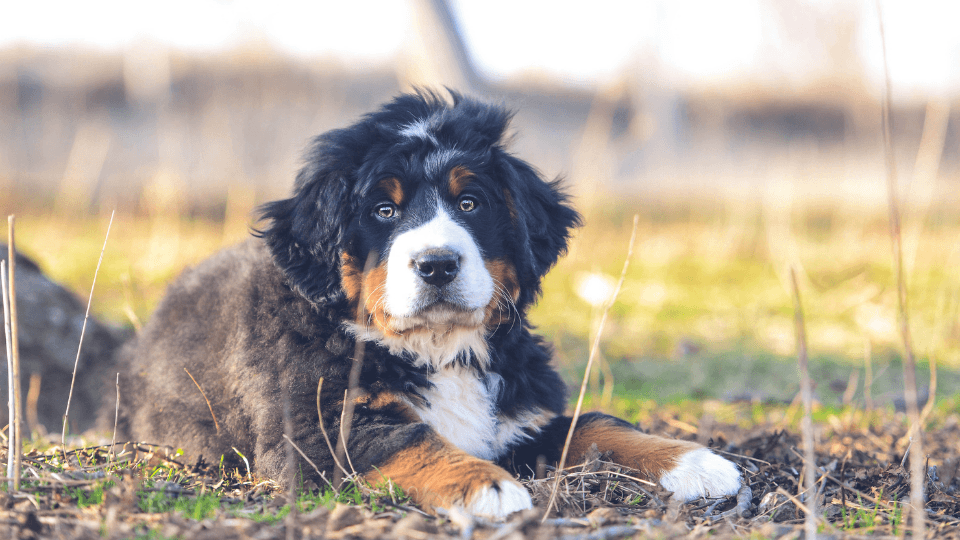Known for their incredible strength, sturdiness, and intelligence, the Bernese Mountain Dog is a large, striking dog with distinctive markings on its face and coat. Initially bred to help on pastures and farms in Switzerland, the Bernese Mountain Dog has a thick coat made to withstand cold temperatures. These gentle giants now make for great family pets, given their outstanding reputation with children and protective nature over loved ones.
So, as a sturdy dog created for tough work on farms, just how big do Bernese Mountain Dogs get? If you’re the lucky pet parent to one of these sweet-natured pups, you can use our Bernese Mountain Dog growth chart to track your puppy’s development.
Here’s everything you need to know about Bernese Mountain Dog weight, size, and growth rate:
- Bernese Mountain Dog Growth & Weight Chart
- At what age is a Bernese Mountain Dog fully grown?
- How big should a 6-month-old Bernese Mountain Dog be?
- How much bigger will my Bernese Mountain Dog get?
- What is the size of a full-grown Bernese Mountain Dog?
- How do I make sure my Bernese Mountain Dog is healthy?
- Key Takeaways
Pro Tip: “Berners” get their name from the mountainous area of Bern, a place in Switzerland famous for its cheese and chocolate exports. And while some dogs can eat cheese in moderation, none can consume chocolate - but the temptation often proves too hard to resist! Accidental poisoning is extremely common in puppies, which can lead to very expensive and unexpected vet bills, so stay on high alert with your Berner around the home.
Bernese Mountain Dog Weight Chart
| Age | Male Weight | Female Weight |
|---|---|---|
| 1 month old | 5 - 10 lb | 4 - 8 lb |
| 2 months old | 15 - 25 lb | 12 - 24 lb |
| 3 months old | 20 - 35 lb | 20 - 35 lb |
| 4 months old | 35 - 55 lb | 30 - 45 lb |
| 5 months old | 40 - 60 lb | 40 - 55 lb |
| 6 months old | 50 - 70 lb | 45 - 65 lb |
| 7 months old | 55 - 75 lb | 55 - 70 lb |
| 8 months old | 65 - 85 lb | 55 - 75 lb |
| 9 months old | 70 - 90 lb | 60 - 80 lb |
| 10 months old | 70 - 95 lb | 60 - 85 lb |
| 11 months old | 75 - 100 lb | 65 - 85 lb |
| 12 months old | 75 - 105 lb | 65 - 90 lb |
| 2 years old | 80 - 115 lb | 70 - 95 lb |
Classified as a “large” dog breed, Bernese Mountain Dogs weigh more than most dogs and display a notable size difference between males and females. Please keep in mind that the above numbers are merely estimates. All puppies will grow at their own rate. If your Bernese Mountain Dog puppy is significantly behind or ahead of the following numbers, consult with your veterinarian.
At what age is a Bernese Mountain Dog fully grown?
Bernese Mountain Dogs grow for about one year. At this time, they’ll be at or near their mature size in terms of height and weight, but most dogs in this breed will require up to two years to completely fill out their chest.
How big should a 6-month-old Bernese Mountain Dog be?
On average, a 6-month-old Bernese Mountain Dog weighs around 50 to 70 pounds (male), or 45 and 65 pounds (female). Both pups will stand around 19 to 23 inches tall, with male puppies being on the taller end of the range.
Pro Tip: New puppy parents have a lot on their plate, so check out our list of essential dog care tips to make #DogMom or #DogDad life much easier. It’s full of advice you can’t miss on bonding with your pet, pet first aid kits, puppy-proofing, microchipping, and more!

How much bigger will my Bernese Mountain Dog get?
There are a couple of ways to estimate how much bigger a Bernese Mountain Dog may get:
- Age. Start with your puppy’s current age. If your Berner is less than a year old, they have considerable growing left to do. After their first birthday, they may gain a little weight and continue filling out their chest, but the extra pounds should be minimal. Use the Bernese Mountain Dog growth chart above to estimate how much more your pup may grow based on how old they are today.
- Paws. Next, take a look at your puppy’s paws. Are they oversized next to their body and legs? Then, your Bernese Mountain pup is probably still growing, as this is a classic adolescent feature.
- Genetics. Did you buy a Bernese Mountain Dog through a breeder? If so, you could also reach out to them and ask about your little guy or gal’s estimated adult size. They should be able to provide you with a more precise estimate of your pup’s adult weight and height based on their parents and their past litters. A puppy is rarely larger than either parent, so this will also provide you with a figure for their maximum weight and height.
How big are Bernese Mountain Dogs full-grown?
The weight of a Bernese Mountain Dog ranges from 80 and 115 pounds in adult males and 70 to 95 pounds in adult females, according to the American Kennel Club (AKC) official breed standards. At full height, these dogs often stand over two feet tall, measuring 23 to 27.5 inches from the floor to the shoulder.

How do I make sure my Bernese Mountain Dog is healthy?
Our Bernese Mountain Dog growth chart can help you monitor your puppy’s weight and confirm it falls within a vet-approved range, but your dog’s diet and exercise will have a big effect on how close your dog stays to these predictions. Note that nearly 60% of dogs in America are obese, which can lead to serious secondary health complications including diabetes and arthritis, so you should be mindful of your Bernese Mountain dog’s weight from a young age.
Like all purebreeds, these dogs are more susceptible to a variety of genetic diseases. In particular, Bernese Mountain Dogs are prone to hip dysplasia, eye cataracts, and Von Willebrand disease.
According to the Veterinary Centers of America (VCA), Von Willebrand disease occurs when there is a lack of a particular protein, called the Von Willebrand factor, which helps platelets clump together and form blood clots. In severe cases left untreated, a minor cut could cause a dog to bleed to death. Treatment usually involves blood transfusions and medications that increase the Von Willebrand factor protein in the bloodstream to improve the dog’s crucial ability to form blood clots.
Pro Tip: New pet parents can get reimbursed for up to 90% of veterinary bills by enrolling in a pet insurance plan. Compare Bernese Mountain Dog health insurance options to have peace of mind knowing that your puppy will have access to gold-standard veterinary care for life.
Bernese Mountain Dog Veterinary Costs
Preventive pet care can play a large part in and minimizing the effects of genetic diseases on your Berner’s quality of life. Prevention is always better than treatment and routine veterinary visits provide your veterinarian with the chance to screen your puppy for signs of disease and provide personalized lifestyle recommendations to keep your pup healthy and happy.
However, even with preventive care, our dogs may require medical treatment for unexpected injuries and illnesses, many of which can cost thousands of dollars. Pet insurance provides you with a financial safety net by reimbursing you for a portion of the money you pay out-of-pocket on veterinary service for covered conditions.
Pet insurance lets you focus on what’s really important - being there for your puppy if anything were to happen - rather than worrying about the cost of dog x-rays, diagnostic tests, and prescription medications. Wellness plans are also available to help with the cost of preventive pet care, including flea/tick prevention, spay or neutering, and so much more.
Bernese Mountain Dogs are more than pets, they’re family members. Protect their health and your financial well-being by finding a pet insurance plan on Pawlicy Advisor, where you can access customized policy recommendations that help you save money over the life of your pet.
Key Takeaways
- Our Bernese Mountain Dog weight chart predicts the weight of your puppy until they stop growing around one year, but many need up to two years to completely fill out their chest.
- Official AKC standards say that male Bernese Mountain Dogs should weigh between 80 and 115 pounds and female Bernese Mountain Dogs should weigh between 70 and 95 pounds.
- As a breed, Bernese Mountain Dogs are more susceptible to hereditary conditions such as Von Willebrand disease.
- The best way to help your Bernese Mountain Dog have a happy, healthy life is with routine vet visits and preventative care, so you may want to enroll in a pet insurance plan today to save money on covered veterinary costs.
